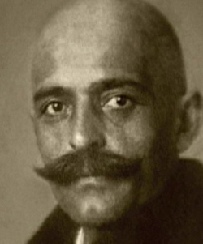

Normally, you would see an ad here. Maybe you are using an ad blocker. I respect that, but this site relies on revenue from ads to continue. Maybe as an alternative you would consider making a donation on the Contribute page.
Normally, you would see an ad here. Maybe you are using an ad blocker. I respect that, but this site relies on revenue from ads to continue. Maybe as an alternative you would consider making a donation on the Contribute page.
Copyright © Sirius Publishing 2006-2019


George Ivanovich Gurdjieff was a Mystic, Philosopher and Spiritual teacher, but most of all he was an intensely practical man. This can be seen in his discipline for self development usually called ' The Work’ (i.e. work on oneself).
The fundamental tenet of The Work is that mankind is ‘asleep’. In other words that human beings live their lives in a kind of waking sleep, stumbling from one unconscious action to another. It is almost impossible for people to recognise this sleep, in themselves or others, because they are asleep and the dream seems real while we are dreaming it. In periods of heightened emotion or increased concentration we briefly wake up and assume that we are always like this but then we fall back to sleep without realising it.
As Gurdjieff says in the title of his third series of writings ‘Life is Real only then, when I Am’.
G. I. Gurdjieff taught in the first half of the 20th century. Little known to-day, he had a big influence on ‘New Age’ ideas.
A Modern Mystic
I am reminded of the words of the G. I. Gurdjieff who said:
‘To know everything it is necessary to know only a very little, but to know that very little is to know pretty much.’
Gurdjieff was famous for his obscurantism. He thought it was important to make people work for their realisations otherwise they would not be valued and more importantly people might believe that they understood profound truths simply because they understood the words in which they were phrased. It is one thing to understand the grammar of a statement and another to grasp the Spiritual truth it might convey.
However the previous quotation is not supposed to be a mind bender but alludes to the fact that only when the mind is empty of mundane facts and figures can it be filled with ultimate truths. Our everyday mental chatter crowds out any genuine realisations.
The realisations that feel like ‘knowing everything’ exist beyond the intellect, and in that sense it can be said that we ‘know’ nothing. Unfortunately to transcend the intellect is far easier said than done. In order to still the mind and junk unnecessary impressions one has to know a good deal about how the mind functions and the tricks that it gets up to. This needs to be coupled with an active discipline that allows one to still the mind and open up to this other source of Knowledge. So in that sense one has to know pretty much.
The sensation of knowing things outside of the mundane belongs to awareness of the Psychic level in the model, but the sensation of ‘knowing everything’ occurs with awareness of the Mystical level.